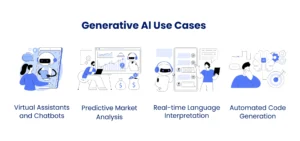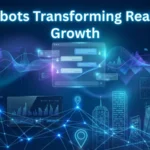Generative AI has evolved from a novelty into a business-critical technology. Across manufacturing floors, marketing teams, banks, hospitals, and classrooms, organizations are finding innovative ways to implement gen AI use cases. These real-world examples show how generative AI in marketing, operations, and customer service is driving measurable outcomes — from cost savings to improved customer experiences.
1. Knowledgeable Production and Industrial Process
Manufacturers have to work with a multifaceted combination of throughput, yield, quality, and safety goals. Margins are easily lost due to unplanned downtime or intermittent maintenance records. Through production, operators can instantly access the information in manuals, maintenance logs, and sensor data to diagnose issues or predict failures by deploying gen AI use cases.
A multinational electronics company has recently introduced a generative AI dashboard that allows engineers to inquire about machine performance using plain language. The system pulls data, which comes instantly, from disparate sources, builds detailed risk assessments, and even suggests maintenance schedules. Plant managers report quicker troubleshooting, better use of assets, and greater production consistency without the need to add to the headcount. It is a good example of generative AI for productivity and scale-level digital transformation.
2. New Retail and Consumer Goods
Retail chains are using generative AI to transform digitally regarding inventory, store operations, and customer service. Artificial intelligence that allows voice-activated shopping, conversational AI, and supplier-negotiation systems is now the norm.
An example of a large grocery retailer that utilises a GenAI assistant is to enable customers to place orders through voice or text, as the employees have real-time answers to questions about the availability of products, prices, or an altered schedule. The system analyzes supplier performance and optimizes replenishment, which is done behind the scenes. These gen AI use cases in marketing provide shorter checkout lines, more engaging in-store experiences, and improved vendor relationships, proving that every touchpoint can be increased with the help of generative AI marketing applications.
3. Banking and Financial Services With Visionary Force
The banking industry is full of information, yet it is at times slow in taking action. A study as shown that gen AI could add $200 to $340 billion to anual value of the sector. The use cases of generative AI in the business have assisted banks in exceeding conventional analytics by simulating the market, identifying possible fraud, and tailoring offers.
The application of a GenAI engine to a wealth-management company created personalized portfolio suggestions to individual clients, informed by risk taking, life objectives, and regulatory limitations. It also makes compliance-ready reports automatically without developers having to focus on strategy. This multifaceted approach demonstrates how generative AI case studies in finance are transitioning out of pilot projects to mainstream productivity benefits.
4. More rapid, Bug-free Accounting
The process of data entry, reconciliation, and reporting has long been a major bane of financial departments. The gen AI use cases automate these processes, find human errors, and make forecasts in minutes as opposed to hours.
Other companies today rely on AI-based applications to simulate different financial situations, enhance audit preparedness, and create board-level reports with detailed data. In this way, they not only become faster but also get a better insight into the cash flow and performance, a true generative AI in the work of productivity.
5. Travel and Hospitality Optimization
Hotels and airlines are continuously pressured to provide a smooth experience and handle challenging logistics. Planning and operations: Travel Generative AI is transforming how travel is planned, operated, and engaged with.
Hotel chains and airlines use chatbots to process booking adjustments, time inquiries, and client requests 24/7. Some are reading newsletters, social media updates, and customized travel suggestions that have been written by GenAI-driven content engines. Scheduling AI tools rerouted flights and rebooked passengers in minutes in the internal pilot of one airline during a disruption, which would have previously triggered mass cancellations. This shows that the gen AI use cases can offer operational efficiency along with a better reputation.
6. Healthcare, Life Sciences Innovation
Healthcare produces vast quantities of complicated data, both in medical images and in research articles. Gen AI use cases assist clinicians, researchers, and administrators with transforming this data into actionable insights.
AI enables clinicians to create succinct summaries of medical literature that is complex, thereby simplifying the process of taking on new treatments. Medical professionals use image processing to detect and characterize abnormalities faster by using refined models. Patients communicate with GenAI chatbots to seek clarifications about diagnoses and procedures. Hospital executives can use AI dashboards to identify trends such as increasing wait times and identify inefficiencies. These enhancements demonstrate that gen AI use cases can elevate the level of care and enhance processes. However, it is important to choose an experienced AI development company to streamline the process.
7. Scalable Human Customer Service
A report has predicted that gen AI use cases will reduce the labor cost by $80 billion. The old chatbots usually irritate users with programmed responses. According to Generative AI case studies, next-generation bots can converse in a natural, context-rich manner, solve problems more quickly, and learn with every interaction.
A single European power company deployed a GenAI bot that takes the place of hundreds of agents, resulting in higher scores of satisfaction and reducing the timeframes of response by many times. The robot improves with time, since it is a continuous learner, which lowers mistakes and hallucinations. This is one of the clearest gen AI use cases proving that AI can both lower costs and elevate the customer experience.
8. Artificial intelligence and sales and advertising
The sales teams use extensive time to personalize outreach, analyze requests for proposals, and make reports. Generative AI marketing tools assist in automating all these activities, but they also unearth information that would require human beings days to gain such insights.
An example is a technology start-up that applies gen AI use cases to assess market trends, optimize messaging, and create multilingual campaigns without the need to employ more personnel. Salespeople use AI to explain complicated graphs, analyze customer data, and detect untapped markets. These practices show how generative AI business use cases can increase revenue without increasing overhead.
9. Marketing at Scale and Speed
One of the largest beneficiaries of GenAI is marketing departments. AI assists teams to generate brand-related copy, create logos, create videos, and even virtual influencers.
Companies will be able to utilize generative AI in marketing to predict trends, personalize campaigns of thousands of SKUs, and repurpose content across platforms without compromise and compliance. Practical gen AI use cases of a fintech marketplace are that it handles thousands of listings in a few weeks instead of months, and offers automatic product descriptions to free marketers up for strategy.
10. Education and Individualized Learning
Teachers and administrators are finding gen AI use cases in grading, lesson planning, and budget analysis. Gamified quizzes, customization of lessons based on the preferences of students, and the ability to provide real-time support to the instructor in a virtual classroom: All these features can be developed with the help of AI development services seamlessly.
GenAI is also used in universities to build targeted outreach to future students and to tune policies on the basis of performance analytics. This demonstrates that even conservative industries such as education are being receptive to the use of generative AI success stories.
11. Fashion and Personal Styling
Fashion is a business that works by its creativity and forecasting trends of fashion, which are some of the areas where gen AI use cases are strong. Using immense collections of past and current styles, designers are able to come up with avant-garde designs and forecast future fashions. Production workflows are also improved by generative AI to minimize waste and make wiser and more sustainable sourcing choices.
These innovations mean personalized shopping for consumers. State-of-the-art technologies can be used to examine body sizes, fashion tastes, and shopping patterns to suggest outfits that fit each customer. Certain brands are even able to have the customers virtually dress up in outfits before buying them, which boosts confidence and reduces returns. These computerized AI marketing tools assist retailers in displaying the products in a smart way and improve the customer experience.
12. Gaming and Entertainment Innovation
Gen AI use cases are revolutionizing creative industries such as film, music, and gaming. AI helps artists to create music together, produce impressive visuals, or create immersive worlds at record speed. Game developers also use AI to automate the creation of the environment, character generation, and even voice generation, thus enabling teams to focus on high-level storytelling.
Studios are now using generative AI to be productive, whether it be scriptwriting, animation rigging, or 3D modeling, sound mixing, and mastering. It is also beneficial to independent creators, who can make high-quality videos, lyrics, or concept art without having to spend large budgets. These AI business applications are redefining the scope of creativity and reducing the cost of production.

13. Mass Media, Mass Journalism
Gen AI use cases are becoming common in newsrooms and media houses to transcribe interviews, write headlines, and perform other processes that are SEO-optimized. This enables the journalists to concentrate on in-depth reporting and leave repetitive duties to AI.
The media is using AI to generate thousands of localized stories a week, generate story ideas, and even do basic sports or election coverage. Others use it to write a video to text, write summaries, or test AI presenters. This trend in the generative AI industry trends 2025 demonstrates how AI technologies are automating editorial processes without eliminating essential journalism.
14. Human Resource Management and Talent Development
Recruitment of talents and development of employees require swiftness, individualization, and evidence-based comprehension. HR Gen AI use cases are used to integrate the talent lifecycle, including recruiting and retention, helping organizations diagnose skills gaps, build training journeys, and pair the right employees with the right opportunities.
The assistants driven by AI can now respond to questions on the career paths of employees, analyze performance data, and suggest personalized learning programs. HR leaders can employ these tools to prepare comprehensive reports, set priorities, and monitor main outcomes. This transformation illustrates how digital transformation with generative AI has the power to produce a more interactive workforce of the future.
15. Automation of Legal Research and Documents
Lawyers are adopting generative AI case studies to conduct research, draft contracts, and review compliance quickly. In contrast to the use of keywords by search engines, GenAI is capable of processing large volumes of data, summarizing significant precedents, and creating case summaries in a few minutes.
Companies turn to AI-based applications to write tax filings, compose personal letters, or read regulatory changes more rapidly. The developed systems that are tuned to legal texts produce arguments comparable to those of an expert attorney, making easy decisions under strict deadlines. These successful examples of gen AI use cases demonstrate that even a very regulated sector can enjoy AI-enhanced efficiency.
16. Rapid Software Development
Developers are also now able to create working code, debug, and test applications much quickly with tools such as GitHub Copilot or AWS CodeWhisperer. This is among the most disruptive AI applications, which puts engineers out of the routine and in the realm of strategic innovation.
Teams are reportedly experiencing shorter production cycles, better code quality, and knowledge sharing since AI is able to interpret complex snippets in plain language. This enables businesses to publish more trustworthy software with fewer resources, which is a good example of gen AI use cases for productivity in the technology department.
17. Car and Logistics Revolution
Generative AI improves the safety and efficiency of transportation networks. AI-driven vehicles can identify road signs, predict dangers, and provide real-time assistance to the driver in various languages.
Gen AI use cases include design simulation, predictive maintenance, and energy-efficient system testing. Logistics companies use AI to streamline routes and dynamically adjust schedules, as well as cut fuel costs. These advancements highlight the way generative AI business applications could enhance passenger safety and operational profitability.
18. Nonprofit Impact and Public Sector
Digital transformation is finding use in the form of generative AI by Governments and nonprofits to enhance services to people. Such tools as BlueDot can notify agencies about the possible health risks by processing a great variety of data and simplifying epidemiological data in plain words.
Other projects are AI-driven translation to keep languages alive, automatic writing of speeches and reports, and simplified proposal creation. This adoption demonstrates that the gen AI use cases can enhance the resilience of the community and inter-agency response.
19. Sustainable Food Systems and Agriculture
Crop genetics to supply chain optimization are only a handful of gen AI use cases in agriculture, which allow farmers to grow more yield with less environmental impact. The artificial intelligence models are used to mimic breeding conditions to create pest-resistant and climate-specific strains and forecast an outbreak before it takes place.
Generative AI is used by food tech companies to create plant-based products tailored to local preferences, nutritional requirements, and seasonal availability. Farmers can access real-time data on the health of their soils, changing weather patterns, and demand, allowing them to make smarter decisions and lower waste – an excellent example of a generative AI success story in the context of sustainability.
20. Network Intelligence and Telecommunications
Telecom operators are incorporating gen AI use cases to predict equipment failures, cyberattacks, and optimize billing. Internal bots help employees in maintenance planning, troubleshooting, and preventing downtimes.
On the customer front, AI minimizes wait times, provides customized service, and alerts about possible security threats. The combination of these generative AI marketing applications and operational tools enhances customer satisfaction, reduces costs, and provides high-quality and sustainable networks.
Conclusion
Generative AI is not a far-off trend anymore; it is already changing the way organizations in various industries innovate, interact, and develop. From fashion, gaming, and media to agriculture, telecom, and legal services, these are just a few gen AI use cases utilized to make processes more efficient, create more creativity, and accelerate the digital transformation. The examples of companies that are implementing generative AI business use cases today are pioneering standards of efficiency, personalization, and customer experience, and are not going to be outperformed by generative AI industry trends in 2025.
We aim to turn these opportunities into quantifiable outcomes at AnavClouds Analytics.ai. By ensuring organizations design customized strategies, implement best practices when it comes to productivity tools, and understand how they can bring business benefits. You may be interested in trying generative AI in marketing, undergoing a massive transformation process, or learning novel gen AI use cases. Our team can assist you in moving through an experimentation to execution workflow. Contact us to learn how we can assist you in unlocking the next generation of generative AI in digital transformation.



